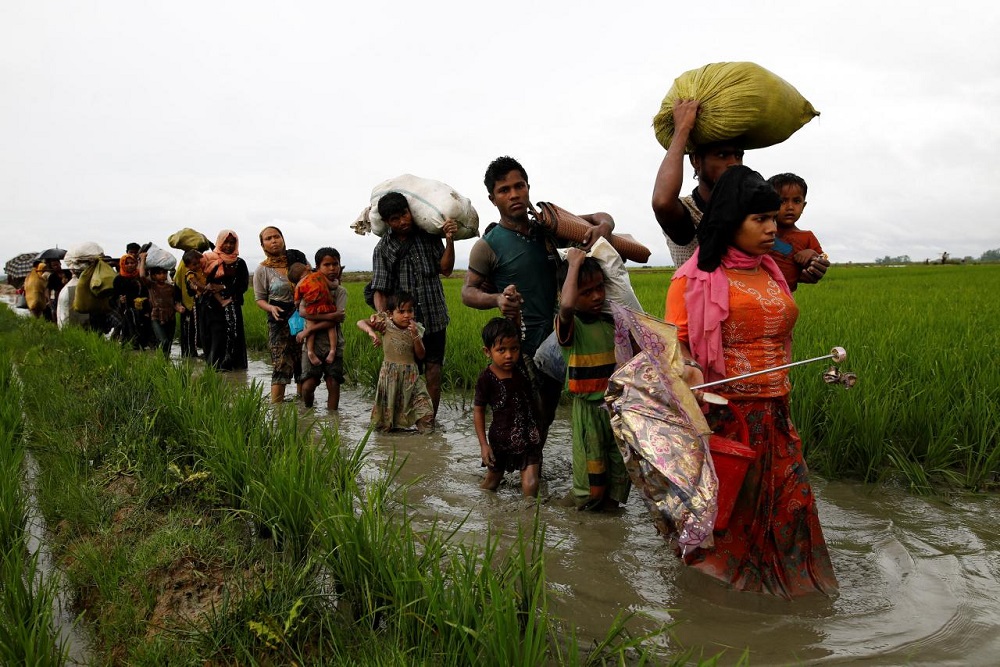Turkish President Recep Tayyip Erdogan informed Myanmar leader Aung San Suu Kyi on Tuesday that violence against the country’s Rohingya Muslims was a violation of human rights.
He told Suu Kyi in a telephone call that the violence was a deep concern to the Muslim world, adding that he will send his foreign minister to neighboring Bangladesh to discuss the fighting.
Myanmar has come under pressure from countries with large Muslim populations to stop violence against Rohingya Muslims after at least 400 people were killed and nearly 125,000 fled to Bangladesh in the deadliest bout of violence targeting the minority group in decades.
Erdogan, who has said that the violence against Rohingya Muslims constitutes genocide, discussed with Suu Kyi potential solutions to the fighting and means to deliver humanitarian aid to the region, presidential sources said.
They said Erdogan had condemned terrorism and operations targeting civilians, voicing concern that the developments could turn into a serious humanitarian crisis.
The latest violence in Myanmar’s northwestern Rakhine state began on August 25, when Rohingya insurgents attacked dozens of police posts and an army base. The ensuing clashes and a military counter-offensive have killed hundreds and triggered the exodus of villagers to Bangladesh.
On Friday, Erdogan said it was Turkey’s moral responsibility to take a stand over the events in Myanmar.
Foreign Minister Mevlut Cavusoglu will travel to Bangladesh on Wednesday evening and hold meetings on Thursday, the Turkish sources said.
Later on Tuesday, Malaysia summoned Myanmar’s ambassador to express displeasure over the violence in Rakhine State.
Foreign Minister Anifah Aman said the latest incidents of violence showed that the Myanmar government had made “little, if any” progress in finding a peaceful solution to problems facing the Rohingya minority, most of whom live in the northwest Myanmar state near the Bangladeshi border.
“Given these developments, Malaysia believes that the matter of sustained violence and discrimination against the Rohingyas should be elevated to a higher international forum,” Anifah said in a statement.
Muslim-majority Malaysia has been particularly outspoken in its concern about the plight of the Rohingya.
Myanmar says its security forces are fighting a legitimate campaign against “terrorists” responsible for a string of attacks on police posts and the army since last October.
In a separate statement, Malaysia’s foreign affairs ministry issued a travel advisory asking Malaysians to defer all non-essential travel to Rakhine State, and for Malaysians in Myanmar to “take all necessary precautions” and be aware of the security situation.
Earlier on Tuesday, the independent Burma Human Rights Network said that the systematic persecution of minority Muslims is on the rise across Myanmar and not confined to Rakhine.
It said that persecution was backed by the government, elements among the country’s Buddhist monks, and ultra-nationalist civilian groups.
“The transition to democracy has allowed popular prejudices to influence how the new government rules, and has amplified a dangerous narrative that casts Muslims as an alien presence in Buddhist-majority Burma,” the group said in a report.
The report draws on more than 350 interviews in more than 46 towns and villages over an eight-month period since March 2016.
Myanmar’s government made no immediate response to the report.
Besides Rohingya Muslims, the report also examines the wider picture of Muslims of different ethnicities across Myanmar following waves of communal violence in 2012 and 2013.
The report says many Muslims of all ethnicities have been refused national identification cards, while access to Islamic places of worship has been blocked in some places.
At least 21 villages around Myanmar have declared themselves “no-go zones” for Muslims, backed by the authorities, it said.
The treatment of Myanmar’s roughly 1.1 million Rohingya is the biggest challenge facing Myanmar de facto leader Suu Kyi, who critics say have not done enough to protect the Muslim minority from persecution.
The London-based Burma Human Rights Network has been advocating among the international community for human rights in Myanmar since 2012, it says on its website.
